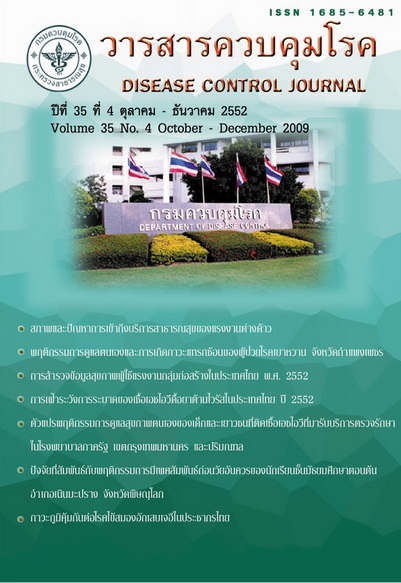Variables Related to Self-Care Behavior of HIV-Infected Children and Youth at Government Hospitals in Bangkok and Its Environs
Keywords:
Self-care Behavior, Children and Youth, HIVAbstract
The purposes of this study were 1) to determine internal variables in term of intention, perceived behavior control, actual behavior control and self-responsibility and external variables of social support and social control in prediction of self - care behavior of HIV-infected children and youth receiving HIV care at government hospitals located in Bangkok and its environs, and 2) to examine the interaction between those internal and external variables related to self - care behavior of HIV - infected children and youth receiving HIV care at government hospitals in Bangkok and its environs. The sample group consisted of 155 HIV - infected children and youth, who were 13 - 24 years; 129 children aged13 - 18 years and 26 youth aged 19 - 24 years. All of them were aware of their HIV-infected status and receiving antiretroviral treatment at infectious clinic in three large government hospitals: Siriraj Hospital, Queen Sirikit National Institute of Children Health and Bumras-Naradure Institute. Data collection was conducted by using 8-item instrument to gather information on personal characteristics and to assess research topics regarding variables. Statistical analysis employed descriptive statistics, t - test, one - way analysis of variance, stepwise multiple regression analysis and two - way analysis of variance. The research finding revealed the following: 1. Variables regarding intention, perceived behavior control, self - responsibility and social control could predict the self - care behavior of HIV - infected children and youth for 67.8% 2. Non interaction between internal variables regarding intention, perceived behavior control, actual behavior control and self-responsibility and external variables including social support and social control which may affect the self - care behavior of HIV - infected children and youth.
Downloads
References
2. ชีวนันท์ เลิศพิริยสุวัฒน์, สัญชัย ชาสมบัติ และพีรมน นิงสานนท์. การประมาณการค่าใช้จ่ายชุดบริการยาต้านรีโทรไวรัสในโครงการหลักประกันสุขภาพถ้วนหน้า พ.ศ.2549 - 2553. วารสารโรคเอดส์. 2549; 19(1): 35-47.
3. Joint United Nations Program on HIV/AIDS (UNAIDS) and World Health Organization (WHO). (2006). AIDS epidemic update. Geneva, UNAIDS, WHO.
4. กุลกัญญา โชคไพบูลย์กิจ. โรคติดเชื้อเอชไอวี/เอดส์ในเด็ก. กรุงเทพฯ: ประชาชน.
5. Ajzen,I. (2006). Theory Planned Behavior. Retrieved August 27, 2006. from www.people.umass.edu/aizen/ tpbrefs.html.
6. Ajzen,I.& Fishbein, M. Understanding Attitude and Predicting Social Behavior. 1980. Englewood Cliffs, NJ: Prentice Hall.
7. ศิริวรรณ โพธ์ิวัน. ความสัมพันธ์ระหว่างเจตนาในการกระทำพฤติกรรมการบริโภคอาหาร เพื่อการเล่นกีฬาและการรับรู้ความสามารถในการควบคุมพฤติกรรมและพฤติกรรมการบริโภคอาหาร เพื่อการเล่นกีฬาของนักศึกษาระดับประกาศนียบัตร วิชาการศึกษาขั้นสูง วิทยาลัยพลศึกษาในเขตภาคกลาง ตามทฤษฎีพฤติกรรมตามแผน. ปริญญา นิพนธ์ วท.ม. (การวิจัยพฤติกรรมศาสตร์ประยุกต์). กรุงเทพฯ: บัณฑิตวิทยาลัย มหาวิทยาลัยศรีนครินทรวิโรฒ. 2546
8. Nejad, L.M.; Wertherim, E.H.;& Greenwood, K.M. Predicting dieting behavior by using, modifying, and extending the theory of planned behavior. In Journal of Applied Social Psychology. 2004; 34: 2099- 2131
9. Cortes, Tomas M. A 1st application of the theory of planned behavior to explain the abandonment of treatment by dependent alcoholics. In Revista de Psicologia General Aplicada. 2001; 54: 389- 405. Retrieved August 27,2006, from
www. people.umass.edu/aizen/tpbrefs.html
10.Jennings - Dozier, K. Predicting intentions to obtain a Pap smear among African American and Latina women: testing the theory of planned behavior. In Nursing Research. 1999; 48: 198 - 205. Retrieved August 27, 2006, from
www.people.umass.edu/aizen/ tpbrefs.html
11.Lewis, Megan A.;& Butterfield, Rita M. Social Control in Marital Relationships: Effect of One's Partner on Health Behaviors. In Journal of Applied Social Psychology. 2007; 37: 298-319.
12.Tucker Joan S.; Elliott Marc N. and Klein David J. Social Control of Health Behavior: Associations With Conscientiousness and Neuroticism. Retrieved July 14, 2007 from http://psp.sagepub.com
13.สงวน สุทธิเลิศอรุณ. พฤติกรรมมนุษย์กับการพัฒนาตนเอง. กรุงเทพฯ: อักษราพิพัฒน์. 2545
Downloads
Published
How to Cite
Issue
Section
License
Articles published in the Disease Control Journal are considered as academic work, research or analysis of the personal opinion of the authors, not the opinion of the Thailand Department of Disease Control or editorial team. The authors must be responsible for their articles.






